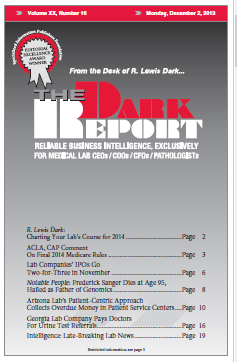CEO SUMMARY: Physicians could make $400 or more per sample, according to one physician. But under the federal Stark Law, the federal Anti-kickback Law, and under Florida state law, physicians and other healthcare providers are prohibited from referring patients or doing work for kickbacks and from splitting fees with other healthcare providers, according to one …
Georgia Lab Pays Docs For Urine Test Referrals Read More »
To access this post, you must purchase The Dark Report.


